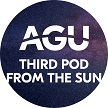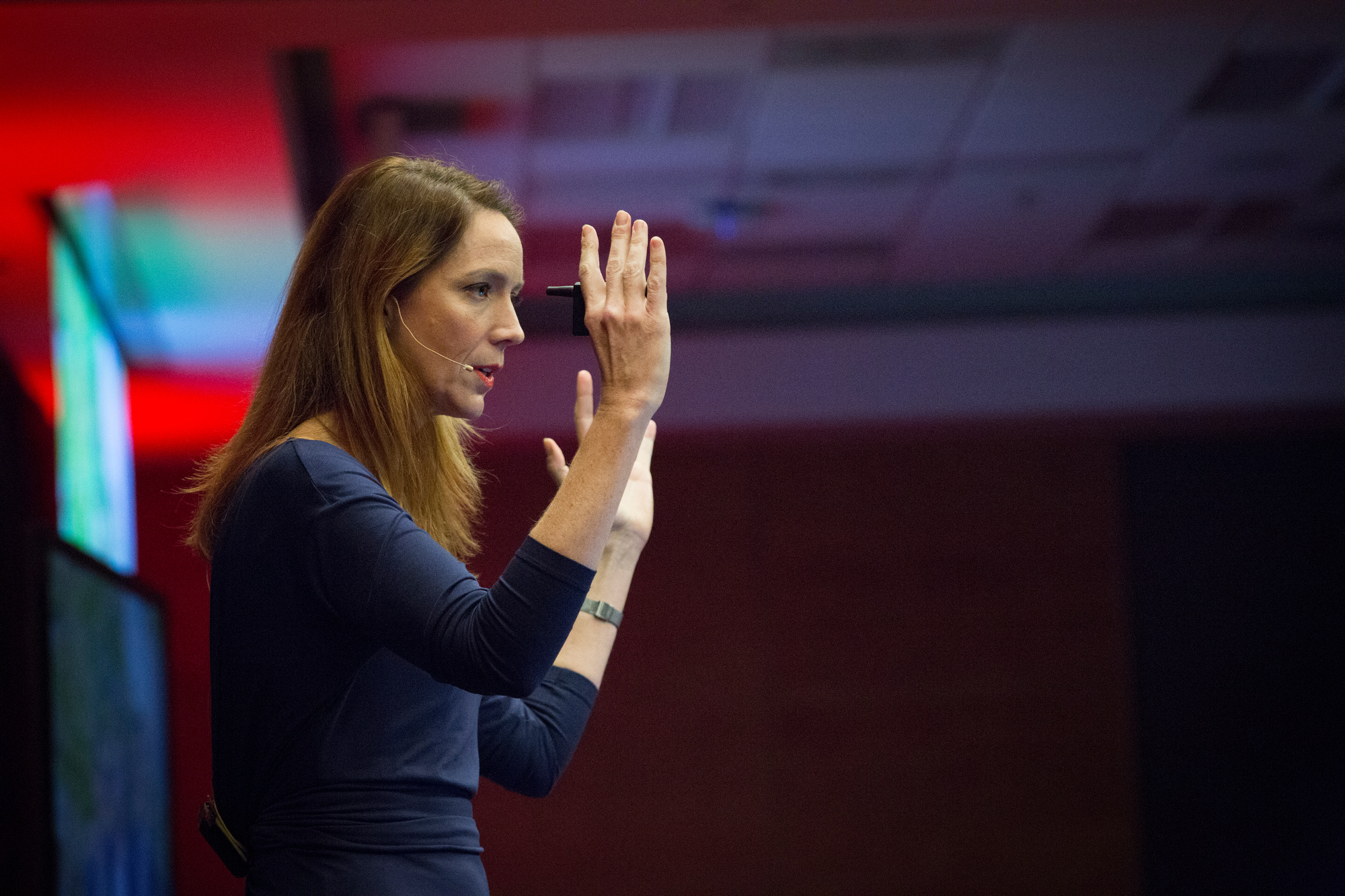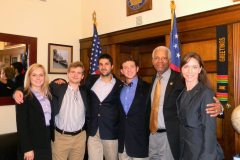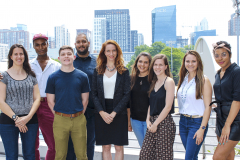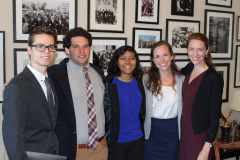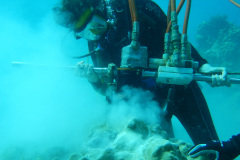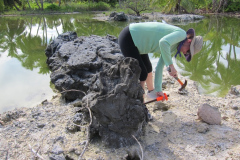Third Pod Presents: Sci & Tell – Kim Cobb, Standing Up for Women in Science
Kim Cobb loves being out in the field. She talks about the euphoria and passion she has for it, saying “It’s like nothing I’ve ever experienced literally, and I’ve given birth to four children.” In this interview, she talks about the connection she feels to the planet and to the people she works with in the field as well as the importance of supporting and promoting women in science. She also discusses the state of science and how it’s in a moment of evolution with room at the table for all kinds of scientists to weigh in.
This episode was produced and mixed by Shane M Hanlon. Special thanks to Jordana Schmierer for production assistance.
Transcript
Shane Hanlon: I was never that kid who knew he wanted to be a scientist from day one. I didn’t have that defining “THIS IS WHAT I WANT” moment. Ever. My realization was a bit different.
As an undergrad, I thought perhaps I’d be a science teacher. I did know that I loved science. And I had some great teachers who I wanted to emulate. And this was reaffirmed by my time as a biomed tech to pay the bills in my freshman and sophomore years. But then I had the opportunity to do field work. Granted, it was with plants and I was more of an animal persons, but it was outside, for a whole summer. I thought, this is going to be awesome!
It wasn’t awesome. I literally had to count the number of leaves and stems of different plants in the blinding sun, pouring rain, and everything in between. Along the way I lost my immunity to poison ivy, went into debt for the first time, and truly missed my life with my friends back in the city where my university was located. But – other folks at the field station were having a blast. They weren’t working with plants. They were working with herps – frogs, salamanders, turtles. I talked to the professor who suggested that I come work in his lab in the fall, which I did, and the following summer I was back at that field station, this time working with animals. Small, slimy, sometimes smelly, animals, but I LOVED IT. That experience literally changed my life and, while I’m no longer a full-time researcher and my field excursions are limited, they’re still my favorite part of being a scientist.
Shane Hanlon: Everyone has a story, even, or maybe especially, scientists. Science affects each and every one of us. Let’s talk about it. From the American Geophysical Union, I’m Shane Hanlon, and this is Sci & Tell.
Shane Hanlon: Turns out that I love herps. Not only b/c they’re animals and oddly adorable, but because frogs, are experiencing global declines on a scale we haven’t seen in recent memory. I found a calling to care about something larger than myself. And I’m delighted today to feature an interview with someone who is not only a champion of science, but also a champion of women in science, and in general, and an advocate for fairness in academia and society.
Our interviewer was Allie Wilkinson and I’ll note that this isn’t the best quality recording but I really love the interview so I hope you will too.
Kim Cobb: My name is Kim Cobb. I’m the Georgia Power chair and director of the Global Change Program at the Georgia Institute of Technology and I’m a Paleoclimatologist.
Kim Cobb: I think my interest in science goes back to when I was a very small child, I really loved observing the natural world. I loved observing everything. I’m just a very keen observer and I find great pleasure in trying to put pieces together the things that I observe happening on our planet and in my environment. The idea that science allows us to unlock that kind of cause and effect in the things that I observe was always just extremely compelling to me.
Allie Wilkinson: So what is your favorite part of the work that you do?
Kim Cobb: I mean the field work for me is by far the passion and just euphoria that I have when I’m in the field. It’s like nothing I’ve ever experienced literally, and I’ve given birth to four children. The connection that I feel to the rest of the planet, the connection that I feel is part of the biosphere such a small little speck trying her best to understand what’s going on. It’s humbling, it’s inspiring, and it just has kept me going for 20 years. The idea that I could get back in the field. Now days I’m busy in the office a lot, but students of mine get to share that passion and in awaken in them a similar lifelong commitment to understanding these places and they are also part of a very privileged few who get to go to these places and actually get paid for it.
Kim Cobb: Oh lots, my field stories range from absolute nightmares that I can almost laugh at now where they’re not lives on the line to moments that… I remember deep moments and connections the local people the places that I work and it’s really the latter that cements in my mind over decades of field work. Is the decades of relationships I’ve built with those people on the ground so these are people who I’ve built a trust with, who understand that I’m not just going to take a rock publish it and hasta la vista. I will be coming back and I’ll be investing in their communities. I’ll be trying to learn as much as I can to extract more value from the precious, priceless rocks that are in their backyards.
It’s really these people when I think of my field work one of the biggest reasons why I’m so excited to go back always is I get to see these ultimately lifelong friends of mine and so those are some of the best stories I have of sharing in their families and sharing meals, and sharing stories with them, and learning about their lives it’s just amazing these folks are incredible.
Allie Wilkinson: On the flip side. Are there any challenges to the work that you do? I mean, any challenges that you’ve had to face and overcome in your career?
Kim Cobb: I mean there are many. I think every scientist faces different kinds of challenges in their
career and certainly as a young scientist you face a shared set of challenges. As a mid-career and as a senior scientist, it’s different. I think one of the things I would say about my own trajectory is that having four kids, two of them pre-tenure and two of them post-tenure is a relatively unique experience. I’m going to go out on a limb and say that. I’m learned a lot about the structural barriers in academia and in science more generally to people who want to have that kind of large all encompassing family life.
Mostly I’ve learned how important it is for those people to have some kind of pay equity to their largely male peers. I’m really focused and part of my work at Georgia Tech to try to insure women, not just scientist, but women all over the campus are not just treated equitably, but supported in their life choices and encouraged to find a way to be fulfilled in their work and fell that they have the level of connection and access to their family whenever they need it.
Allie Wilkinson: That’s really fantastic that you’ve taken that life experience and brought it into a bigger sphere to help more people because it’s so necessary to have those changes occur. Do you have any specific advice for people in that situation?
Kim Cobb: I think one of the things I’ve learned is that it’s really really important to build, proactively, a community for yourself before you take that leap and bring someone into this world. And try to understand how you might be able to structure your work, structure your family life. To think that it’s going to be different for you, will just create a heap of problems. I think everyone goes into it thinking, it’s going to be better for me. I’ve got this. You don’t have it. You need to learn from the wise women who came before you. Don’t go it alone. They have lessons for you. They have support for you. They have two AM phone calls they can receive from you. This is the biggest lesson that I wish I had had the wisdom to enact before I brought somebody into world. But I encourage women all over to recognize, while we look busy and engaged and like we have it all together, we have a long list of previous battles that we have fought just like them. All the experiences they go through that are challenging are very common experiences. We can learn to help each other avoid those and minimize the damage of going through that, which can be gut reproachingly tiring and exhausting and depressing. We have to help each other out because women have the lessons, women have the answers here.
Kim Cobb: Science is undergoing some profound structural shifts right now. It’s obvious. Science has become vehemently and virally under attack from certain segments of political establishment and we find ourselves at a crossroads of having to reflect on the failures of the scientific intuitions of yesteryears and dream about what we want to build to be more effective stewards of the investments the public has made in our institutions and more informative stewards of policies that are coming out from the results of the studies and all the research body of evidence that we have accumulated.
We sit at that nexus right now and we are evolving extremely quickly. The only question is do we really understand enough, clearly enough, about where we are going and where we’d like to go. Can we be proactive and not reactive? I would like to think very much that there’s a role for women scientist in that conversation and that envisioning. Grounded in equity. Grounded in solutions. Grounded in conversation and dialogue that I would love to be a part of. I aspire to be a part of. I hope to bring as many of my students along as possible. It’s an exciting time in science, but it’s also one that calls for some pretty profound reflections on some of our feelings. We can’t have one without the other.
Kim Cobb: People ask me if I have hope for climate change and are we going to ever get out of this predicament. I say “I know we will because these young people will make sure we will. They have their eyes on the prize. They are super savvy and they are brave. They have the moral courage. I’m just very very optimistic, in fact, from what I see of them right now. It’s so inspiring.
Shane Hanlon: Optimism is so key, in so many respects. Climate change is a big one and many of us can probably relate to another big one as we’re probably holed up at home for the foreseeable future. When talking about scicomm messaging with folks, I like to say that it’s not helpful to tell people to recycle if you’re preaching about the end of the world. What’s the point? So let’s take a note from Kim and be hopeful and I want to thank her for sharing her stories with us.
Thanks also to Allie Wilkinson for conducting this interview.
If you like what you’ve heard, stay tuned for more episodes tucked in amongst your regular Third Pod episodes.
From this scientist in the studio, to all of you out there in the world, thanks for listening to our stories.
